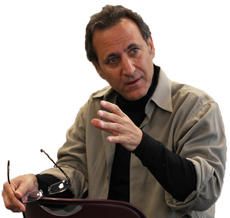Grief
Death, Dying, and Altered States: Bridging Two Realities
Communicating with people in altered states of consciousness
Posted December 10, 2013
I visited my mother just a few months before she passed; that was about two years ago now. We went out to dinner in a restaurant attached to a casino. After dinner she went to play blackjack and I went to the bathroom. I came back minutes later, sat next to her and said, “How’s it going?” She looked at me strangely, clutched her purse, and said, "I’m waiting for my son.” I replied, “I’m sure he’ll be back soon.”
My mother had many moments in her final months when she was in an “altered state” —a way of perceiving and communicating that was outside of conventional reality. We went on imagined vacations and cruises together; recreated some history (stories that strayed from the truth that we nonetheless “agreed” were the real stories); I even gave her a new Spanish name that made her giggle and helped me let go of the person she used to be. I saw no reason to insist on conventional reality or my reality. In fact, her altered state allowed us to have a new chapter in our relationship, one I was really thankful for.
Joining her “reality," her altered state, even allowed a sweet healing. As a youth, I was the black sheep of the family and, as a result, rather challenging in my viewpoint and under-appreciated for my perspective; however it left me longing for her understanding. (An understanding I had long since let go of ever getting.) A few weeks before she died she looked at me lovingly and appreciatively and said, “How did you get this way? You’re such a deep and caring man.” It touched my heart deeply knowing she never would have seen me this way or uttered those words when she was in her “right mind.”
Recently, I shared this story with some friends, who responded with their own stories. One friend was amazed at the relationship she had with her father before he died and the things she learned from him. She wrote, “I met monkeys in the kitchen with my father, took walks to radiography labs down the street, and learned about my father as a child, stories he had never shared before . . . journey with your elders friends, they are no longer what you think they are supposed to be, but who they become can be amazing.”
Another friend, Tamara, also explored letting go of her reality and opening to her mother’s altered state. She wrote, “My mom has created some cool new stories in recent years, including a visit to the North Pole and that she used to surf! I think it is a little harder sometimes to drop the part that wants to correct the story when the person is still mostly in a familiar state than when the person is more often in other states. I am finding it easier to flow with my mom now that she is more often in other states.”
And then there is Rich who felt misunderstood by his mother most of his life. He thought that her altered state would allow her the opportunity to see him differently; while this did not happen, it was nonetheless freeing. Here are his words, “During the advanced stages of her Alzheimer’s, my mother became fun-loving and animated…much unlike the mother I knew. I will always remember one of our last meetings, during which I (ill advisedly!) attempted to come up with a very sincere, heartfelt "capstone" statement laying out who I felt I had become and what my priorities of life actually were. She listened with a curious intensity and attention. When I was done, she looked into my eyes and said, "You gotta mend your ways!" I felt almost faint with her response. The stunning part for me was that in her state, she had expressed the fractal [the essence of the pattern] that had defined our relationship for our entire relationship history!”
Kelley found herself able to let go of conventional reality and just enjoy a woman she cared for in a nursing home. She wrote, “I repeatedly celebrated an elderly woman's sweet 16th birthday in a nursing home; it was a blast for both of us every time.”
Neal was touched by the final moments he spent with his grandfather. While his grandfather had some capacity to communicate normally, he also shared a dream (a kind of altered reality) that was particularly meaningful. He wrote, “I got to visit my grandfather in the hospital the day before he passed away. I came in from college to see him. My Mom told me that he was no longer conscious, but when I walked into the room, he was fully awake and we had a great conversation for the next couple of hours. He told me he had a dream that he and I were fishing on my boat (we went fishing a lot together) and it seemed so real. He passed away the next day. It was one of the most powerful memories that I have and one that I will never forget.”
Another friend, Steven, was struck by his father’s unintended, yet marvelous, sense of humor. Rather than trying to help his father understand, he simply enjoyed him. He reported, “My Dad had an aide, Gene. But he calls him Sidney, and now so does everyone else when they around my Dad. One day Gene walked out of the room, and Dad asked where he was. He was told he'd be back in a few minutes, and Dad said ‘Oh, he's back from Australia?’"
And finally, Edie wrote, “End of life times can be incredibly precious; I had that with my mother as well. We went on ‘trips’ too. My favorite was Hawaii, where neither of us had gone in this lifetime.”
I readily understand the grief and heartache that sometimes arises when a loved one is no longer “here” communicating in conventional reality. I understand the impulse to correct them and somehow bring them back to a world in which we are familiar. But, dear readers, consider the possibility of entering the world of your loved one’s, their “altered state.” If you can, enjoy it; you may even discover a relationship that had always been there waiting for you—one that you may not want to miss.
********************************
You might also like:
Restoring Soul: Putting Psyche Back in Psychology
Let’s Keep in Touch!

Let’s Keep in Touch!
To find out about recent interviews, articles, and events, click here.
Schedule a one-on-one counseling session: dbedrickspeak@mac.com
Follow me on Twitter.
Find me on Facebook.
To read more of my posts on this blog, click here.
I am the author of Talking Back to Dr. Phil: Alternatives to Mainstream Psychology. Signed copies of the book are for sale on my website: www.talkingbacktodrphil.com.
Author Photo by Lisa Blair Photography.




